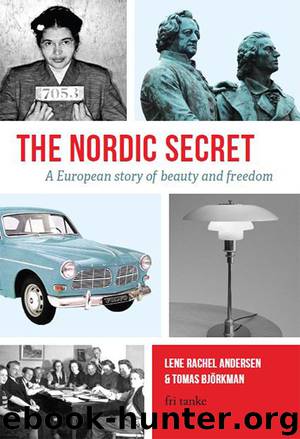The Nordic Secret by Lene Rachel Andersen & Tomas Björkman

Author:Lene Rachel Andersen & Tomas Björkman [Andersen, Lene Rachel & Björkman, Tomas]
Language: swe
Format: epub
ISBN: 9789177733577
Publisher: Fri Tanke förlag
Published: 2017-09-15T00:00:00+00:00
BILDUNG IN SWEDEN
The homegrown thinking about Bildung in Sweden is in line with the German New Humanism and happens among professors, bishops and, generally, people from Uppsala and Lund universities. Particularly around Uppsala, a social life develops among the elite where, as the sons of the bourgeoisie and aristocracy begin their studies, the wealthier families move to the Uppsala region and start socializing. Not just among themselves but with the professors who, in some cases, hold private lectures for friends and students. The people of economic and intellectual prosperity start mingling, and two of the meeting places are Malla Silfverstolpe’s Salon and the society balls held by the local governor, Robert von Kraemers. His events are purely social; Silfverstolpe’s Salon is where the participants find the intimacy of deeper intellectual conversations.
This top-hat and crinoline crowd approaches Bildung, not as a collective awakening as a people that includes the peasants, but like the German, Danish and Norwegian elites at the time: there is something genuine about the peasants and they hold some core of the indigenous spirit, but God forbid one would ever have to rub shoulders with them. This elite is fluent in German and French, many in English too, and many know the works of Herder, Schiller, Goethe, Fichte, etc.; their echo-chamber is focused only on Bildung regarding the high school and university students. Contrary to Denmark and Norway, there is no “rebellion” against foreign languages in Sweden.
We are not going to dwell on any of the Swedish Bildung proponents as such because their thinking is very similar to Neuhumanismus elsewhere: society is changing and education must change too. What is interesting though is that Bildung to them, as it was to the Germans, was a personal development in stages. It is also clear how much more complex the understanding of Bildung was 200 years ago than we generally give the concept credit for today. The following four thinkers we have found in the Swedish anthology Bildning (Bildung) from 2010 and we asked one of the editors if the oldest included text from 1826 by Erik Gustaf Geijer is also the oldest Swedish text about Bildung. It is not, but it is the earliest Swedish text to present the secular concept of Bildung in an academic and clear form.
Download
This site does not store any files on its server. We only index and link to content provided by other sites. Please contact the content providers to delete copyright contents if any and email us, we'll remove relevant links or contents immediately.
| Administration | Adult & Continuing Education |
| Business School Guides | College Guides |
| Financial Aid | Graduate School Guides |
| Law School Guides | Medical School Guides |
| Test Preparation | Vocational |
Spare by Prince Harry The Duke of Sussex(5176)
Navigation and Map Reading by K Andrew(5150)
Tuesdays with Morrie by Mitch Albom(4769)
Machine Learning at Scale with H2O by Gregory Keys | David Whiting(4292)
Cracking the GRE Premium Edition with 6 Practice Tests, 2015 (Graduate School Test Preparation) by Princeton Review(4279)
Never by Ken Follett(3937)
Goodbye Paradise(3799)
What It Really Takes to Get Into Ivy League and Other Highly Selective Colleges by Hughes Chuck(3747)
Fairy Tale by Stephen King(3370)
Harry Potter and the Prisoner of Azkaban (Book 3) by J. K. Rowling(3347)
Pledged by Alexandra Robbins(3170)
Kick Ass in College: Highest Rated "How to Study in College" Book | 77 Ninja Study Skills Tips and Career Strategies | Motivational for College Students: A Guerrilla Guide to College Success by Fox Gunnar(3118)
Reminders of Him: A Novel by Colleen Hoover(3092)
A Dictionary of Sociology by Unknown(3073)
Sapiens and Homo Deus by Yuval Noah Harari(3065)
The Social Psychology of Inequality by Unknown(3018)
Will by Will Smith(2908)
Graduate Admissions Essays, Fourth Edition: Write Your Way into the Graduate School of Your Choice (Graduate Admissions Essays: Write Your Way Into the) by Asher Donald(2907)
Zero to Make by David Lang(2778)
